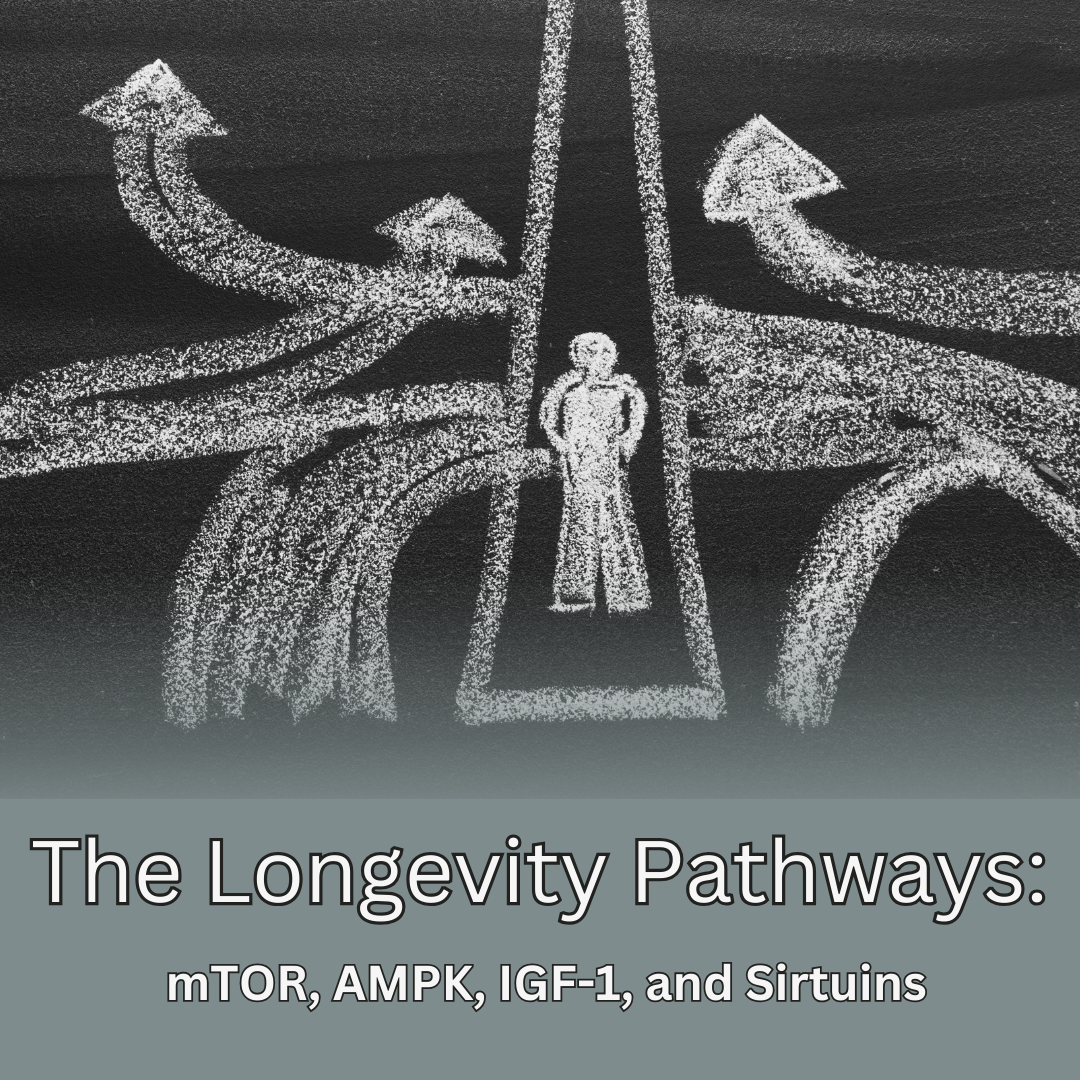
The Longevity Pathways: mTOR, AMPK, IGF-1, and Sirtuins
Share
The Longevity Pathways: mTOR, AMPK, IGF-1, and Sirtuins
The concept of longevity is closely tied to how our cells manage energy, stress, and resources. By understanding and safely influencing key cellular pathways, such as mTOR (mechanistic Target of Rapamycin), AMPK (AMP-activated protein kinase), Sirtuins, and IGF-1 (Insulin-like Growth Factor-1), we can improve our health span—the period of life lived in good health. These pathways play significant roles in regulating aging, metabolism, and cell repair.
In this blog, we’ll explore how these pathways operate and how they can be modulated to extend lifespan and improve health span safely.
1. The mTOR Pathway: Master Regulator of Growth
What is mTOR?
mTOR is a protein kinase that regulates cell growth, metabolism, and protein synthesis. It senses nutrient availability and energy levels in the body. When nutrients are abundant, mTOR is activated, promoting growth and repair. However, chronic activation of mTOR is associated with accelerated aging, cancer, and metabolic diseases.
How mTOR Affects Aging
Excessive mTOR activity leads to:
- Reduced autophagy, a process that removes damaged proteins and organelles, crucial for preventing cellular aging.
- Increased risk of diseases linked to aging, such as cancer, due to over-proliferation of cells.
- Shortened lifespan in various animal models when mTOR is hyperactive(
How to Modulate mTOR Safely for Longevity
- Caloric Restriction: Reducing caloric intake without malnutrition has been shown to lower mTOR activity and promote autophagy, increasing lifespan in many organisms.
- Intermittent Fasting: Alternating periods of eating and fasting inhibits mTOR, enhancing cellular repair mechanisms.
- Exercise: Physical activity modulates mTOR, promoting muscle repair and reducing its overactivity to prevent excessive growth.
- Rapamycin: This drug inhibits mTOR and has been shown to extend lifespan in animal studies. However, its use in humans is still experimental and not without risks.
2. AMPK Pathway: The Energy Sensor
What is AMPK?
AMPK is an enzyme that is activated when cellular energy is low, such as during exercise or fasting. It encourages energy production by boosting glucose uptake and fat oxidation while inhibiting processes like protein synthesis. AMPK is essential for maintaining energy balance in cells.
How AMPK Affects Aging
AMPK promotes longevity by:
- Enhancing autophagy, helping cells clear out damaged components.
- Encouraging mitochondrial biogenesis, improving the efficiency and energy production of cells.
- Inhibiting mTOR, balancing growth and repair in favour of longevity.
How to Activate AMPK Safely
- Exercise: High-intensity interval training (HIIT) and endurance exercises are potent AMPK activators.
- Intermittent Fasting or Caloric Restriction: These dietary strategies increase AMPK activity, improving metabolism and cellular repair.
-
Supplements:
- Metformin: A diabetes drug known to activate AMPK, it’s currently being studied for its potential to extend human lifespan(
- Berberine: A natural compound that also activates AMPK and improves insulin sensitivity(
3. The IGF-1 Pathway: Growth and Aging
What is IGF-1?
IGF-1 (Insulin-like Growth Factor-1) is a hormone that plays a critical role in growth and development, particularly during childhood. It is closely related to insulin and is stimulated by growth hormone (GH). While IGF-1 promotes growth, high levels of it in adulthood are linked to accelerated aging and cancer.
How IGF-1 Affects Aging
IGF-1 promotes cellular growth, but elevated levels in adulthood can lead to:
- Increased risk of cancers, as IGF-1 promotes cell proliferation.
- Reduced lifespan in animal studies where IGF-1 is overexpressed.
- Lower IGF-1 levels have been associated with extended lifespan in humans and other species.
How to Safely Modulate IGF-1
- Moderate Protein Intake: Protein, especially animal-based, increases IGF-1 levels. A moderate protein diet in adulthood, coupled with higher protein intake in younger years, may be beneficial for balancing growth and longevity.
- Fasting: Intermittent fasting or long-term caloric restriction lowers IGF-1 levels, promoting longevity and reducing cancer risk.
- Exercise: While exercise increases IGF-1 to repair muscles, it balances with AMPK activation, maintaining healthy cellular growth without overactivation.
4. The Sirtuin Pathway: Cellular Repair and Longevity
What are Sirtuins?
Sirtuins are proteins that regulate cellular health by influencing gene expression, DNA repair, and the body’s response to stress. The most researched sirtuin, SIRT1, plays a crucial role in longevity by promoting autophagy and improving mitochondrial function.
How Sirtuins Affect Aging
Sirtuins promote longevity by:
- Enhancing DNA repair mechanisms.
- Promoting mitochondrial biogenesis, improving cellular energy production.
- Reducing inflammation and oxidative stress, two key factors in aging.
How to Activate Sirtuins Safely
- Resveratrol: Found in grapes and red wine, resveratrol activates SIRT1, mimicking the effects of caloric restriction.
- NAD+ Boosters: Sirtuins require NAD+ to function. NAD+ levels decline with age, but supplements like nicotinamide riboside (NR) and nicotinamide mononucleotide (NMN) can restore NAD+ and enhance sirtuin activity.
- Fasting and Exercise: Both intermittent fasting and exercise increase sirtuin activity by boosting NAD+ availability and reducing cellular stress.
Balancing Longevity Pathways: A Holistic Approach
It’s important to understand that longevity pathways like mTOR, AMPK, IGF-1, and sirtuins are interconnected. Each pathway contributes to different aspects of cellular growth, repair, and energy management.
While modulating these pathways can improve health span, balance is key. Over-suppressing or excessively activating any pathway can have adverse effects:
- Chronic mTOR activation promotes growth but accelerates aging and disease risk.
- Excessive AMPK activation can inhibit growth and repair necessary for muscle maintenance.
- IGF-1 modulation requires careful balance, as too much can increase cancer risk, while too little can impair vital growth and repair processes.
Tips for Safely Modulating Longevity Pathways
- Adopt a Balanced Diet: Focus on a Mediterranean-style diet with controlled caloric intake. Avoid excessive protein intake, especially from animal sources, which can elevate IGF-1.
- Practice Intermittent Fasting: Time-restricted eating balances mTOR, IGF-1, and AMPK, supporting cellular repair and reducing the risk of chronic diseases.
- Exercise Regularly: Both endurance and resistance training activate AMPK and balance IGF-1 for muscle repair without over-promoting growth.
- Consider Natural Supplements: Resveratrol, NAD+ boosters, and berberine can support the safe modulation of pathways like sirtuins and AMPK.
- Manage Stress: Chronic stress can exacerbate aging pathways by increasing oxidative stress and inflammation. Stress management practices like meditation or yoga can help.
Pathways to a Longer, Healthier Life
By understanding and modulating key longevity pathways like mTOR, AMPK, IGF-1, and sirtuins, we can influence the aging process and extend our health span.
The key lies in achieving balance—activating beneficial processes while preventing harmful overactivation. This holistic approach, combined with exercise, balanced nutrition, stress management, and possibly safe supplementation, offers a promising way to live healthier, longer lives.
